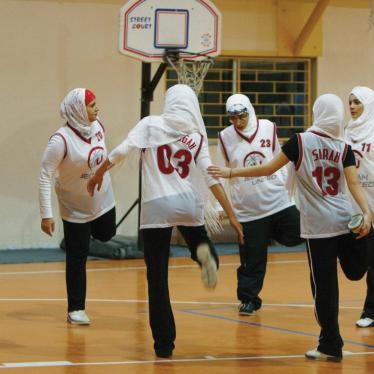Four months before the start of the 30th Olympic Summer Games in London, the International Olympic Committee needs to put Saudi Arabia’s lack of compliance with the IOC charter on the agenda at its next executive board meeting in May.
So far, the IOC is putting all its faith in Saudi promises that perhaps a Saudi woman athlete will participate for the first time for the desert kingdom. Faith in promises is not enough. And even if Saudi Arabia keeps its promise that will hardly alter its systematic discrimination against women in sport.
Women play sports in all Muslim and Arab countries with support from their governments and national sporting authorities – except in Saudi Arabia. Arab women can be proud of sports stars like Nawal El Moutawakel of Morocco, Hassiba Boulmerka of Algeria, or Lulwa and Balsam Al Ayoub of Kuwait.
Government policy, not religion, is the barrier to Saudi women enjoying equal access to sports. Saudi clerics agree there is no religious prohibition on women exercising, but some assert that there are dangers in the public aspect of sport. Those clerics protest that women playing sports may dress immodestly, “unnecessarily” leave their houses, and mingle with unrelated men.
Allowing women to play sports needn’t entail moral hazards. Saudis can create an environment in which women can safely and comfortably play sports. Barring them from sports is not the answer, yet that is the sad reality in Saudi Arabia.
Boys, but not girls, receive physical education in state schools. In 2009 and 2010, the government closed women’s gyms, contending that they were unlicensed, but then denied licenses to women who applied. Neither the Saudi National Olympic Committee nor the Saudi national sports federations, or the country’s 153 government-regulated sports clubs, have women’s sections. The lack of any sports infrastructure for women effectively bars them from participating in sport.
The IOC charter proclaims sport to be a right for everyone and prohibits gender discrimination. Despite evident gender discrimination in sport in Saudi Arabia, the IOC still claims that “a lot can be achieved through dialogue.”
Prince Faisal, head of the Jordanian National Olympic Committee and an IOC member, cited “cultural reasons” for Saudi intransigence, saying he believed the Saudis were moving “in the right direction.” Saudi Arabia’s record of broken promises sheds doubt on that belief.
In November, Prince Nawaf bin Faisal Al Sa’ud, the Saudi NOC president as well as youth and sports minister, said that Saudi Arabia would send only a men’s team to the London Olympics. “If there is to be women’s participation,” he added, “it would be by invitation” from international sporting bodies. This is less than enthusiastic official support for women’s participation.
On the key question of physical education for girls, the education minister, Prince Faisal bin Abdullah, said last August that his ministry was still “studying” the issue. In January, Deputy Minister for Girls’ Education Norah al-Fayez asserted that girls’ physical education was among her top priorities, but no concrete steps have been announced to set up the program.
After rumors surfaced in late January that a new sports stadium in Jeddah to be completed in 2014 would allow women spectators for the first time, Ahmed al-Ruzi, office director for the Sports Ministry, promptly denied it, saying that, “No official decision has so far been issued allowing women to enter sports arenas and to attend matches at this time.”
In 2007, the Shura Council, an appointed quasi-parliament, proposed to create five women’s sports clubs by the beginning of 2011. In May 2011, Yusif Khamis, the Ahsa province director, said the Sports Ministry was planning to open sports clubs for women. Neither promise has been kept.
With the IOC talking to the Saudi authorities in the run-up to the Olympics over their failure to nominate women athletes, the IOC should make clear that neither dialogue nor a focus only on female Olympians is enough. The string of broken promises shows that the IOC needs to get tough with the Saudis. Even if the Saudi NOC admitted one female athlete to its delegation for the 2012 London Games, that would change nothing for millions of Saudi women unable to exercise or play sports.
In Afghanistan, the IOC lived up to its charter, barring that country’s National Olympic Committee from the 2000 Sydney Olympics over blatant discrimination against women, among other factors. The IOC should tell the Saudis that they, too, face a ban. Its charter and historic precedent give it a clear mandate to do so. IOC action is imperative given the Saudi track record of inaction. By putting Saudi lack of compliance with the Olympic values identified in the IOC charter on the agenda at its next executive board meeting in May, the IOC would send the strongest signal yet that it is serious about the last holdout against women’s right to play sports.
Rima Abdallah, a Saudi women leading an amateur soccer team, indicated the good will the IOC can be expected to reap: Saudi women will “raise the [national] flag so high,” she said, if only given a chance to compete internationally.
Christoph Wilcke is a senior Middle East researcher at Human Rights Watch







